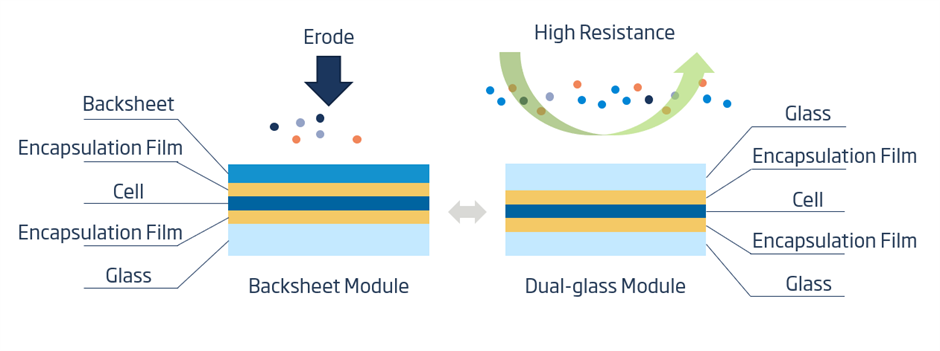Solar-Driven Net-Zero Business Operations: How Trinasolar Empowers Corporate Sustainability
- 24/06/26
- C&I,Business of Solar,Responsible Earth
As businesses face increasing pressure to be environmentally friendly, many are now prioritizing net-zero emissions as a core aspect of their corporate sustainability strategy. A 2023 report highlighted this shift: 66% of the Fortune Global 500, the world's 500 largest companies by revenue, are committed to achieving carbon neutrality, net-zero emissions, or have adopted climate initiatives like the Science Based Targets Initiative (SBTi) or RE100. This transition to sustainable business operations is more than a response to global demand – it is a fundamental step towards embedding lasting sustainable practices within the corporate fabric.
Why Net-Zero Operations Matter
Net-zero operations involve balancing out the carbon emissions your business produces by removing an equivalent amount of carbon from the atmosphere. Achieving this balance is not just a theoretical ideal, but a practical necessity in the global race to limit global warming to 1.5°C by 2050.
With growing climate concerns worldwide, businesses are facing pressure to adopt sustainable business practices and align their operations with overarching environmental goals. Central to these efforts is the adoption of cleaner renewable energy options, particularly solar energy. Solar energy, expected to account for 20% of the global energy mix by 2050, plays a pivotal role as a key enabler in realizing corporate sustainability goals and reducing carbon footprint.
The Advantages of Harnessing Solar Energy for Sustainability

Unlocking corporate sustainability with the sun: Solar panels power the facilities of a Pakistani business (Image credits: Sapphire Group Pakistan)
Net-zero operations are essential for a corporate sustainability strategy that synergizes economic viability, environmental conscientiousness, and social responsibility. It is especially important for businesses that need to maintain strong environmental, social, and governance (ESG) standards.
In this transformative environment, solar energy emerges as a clear solution. Unlike traditional energy sources, solar energy does not deplete our planet's finite resources, and can be easily installed on unutilized spaces, like extra land or rooftop spaces, provided they receive sufficient sunlight. Advancements in solar technologies have also made it more economically viable, with lower Levelized Cost of Energy (LCOE) than ever before.
The fusion of corporate social responsibility and innovative solar technologies sculpts a future where sustainable practices and business success are seamlessly intertwined. It also aligns perfectly with the growing importance of ESG reporting and transparency with stakeholders about a company's environmental practices.
1. Cutting Carbon Emissions with Advanced Solar Technologies
Solar power cuts carbon emissions by generating clean electricity from sunlight without any carbon emissions throughout the entire project lifecycle. Constant innovations in efficiency and manufacturing further reduce its environmental impact, making it a vital tool for a net-zero future. For instance, Trinasolar's switch from a plastic backsheet to a dual-glass design in its Vertex S+ solar modules not only enhances reliability, flame-retardant performance, and resistance to environmental erosion, but also reduces plastic use, cutting carbon emission from production by 11%.

Higher resistance to environmental erosion with dual-glass modules.
By incorporating solar power into their sustainable energy practices, businesses transcend the foundational aspects of corporate social responsibility. They reposition themselves as fervent stewards of global environmental preservation, actively fostering a shift towards a sustainable and eco-conscious operational ethos.
2. Reducing Water Usage and Environmental Impact
Beyond its positive impact on air quality and carbon emissions, solar energy adoption offers environmental benefits through reduced water consumption. The water consumed throughout the lifecycle of solar photovoltaics (PV) systems is significantly lower than conventional power generation methods that rely heavily on water for cooling processes; a study by Finland's LUT University found that solar PV systems are consume between 2% and 15% of what coal and nuclear power plants need for the same amount of electricity generated.
By switching to solar, businesses can dramatically reduce their overall water footprint, lessening the strain on freshwater resources and promoting environmental sustainability in a holistic manner.
How Trinasolar's Sustainable Solar Solutions Fits in Your Corporate Sustainability Strategy
The right solar manufacturer is crucial in your quest for corporate sustainability. As a renowned solar panel manufacturer, Trinasolar stands at the forefront of driving sustainable energy practices that shape a more environmentally conscious business landscape globally. Here's why businesses across the Asia Pacific region and around the globe choose Trinasolar as their solar module manufacturer:
1. Green Manufacturing and Operations
Trinasolar's commitment to sustainability starts at the source. We integrate sustainability into every aspect of our manufacturing and operations, ensuring that businesses can confidently rely on our products to reach their sustainability goals. In 2023, our manufacturing hubs sourced 24.09% of their energy from renewable energy sources, largely from our own rooftop solar installations at our facilities. This proactive approach not only reduces our reliance on the grid but also supports the local energy transition by feeding clean energy into the local power grid.
We also lead by example with our innovative green building strategies and environmentally conscious practices. Our Yiwu factory was the first in the PV industry to achieve zero carbon status, setting a new standard for PV factories. Following this success, other facilities, such as those in Suqian and Yancheng, have also transitioned to zero-carbon operations.

The first Zero Carbon Factory in the PV industry: Trinasolar's 210 Vertex Super Factory in Yiwu, China
2. Product Lifecycle Green Management
Since our inception in 1997, Trinasolar has been a fervent champion of green development. Our multifaceted approach to product lifecycle green management encompasses a rigorous commitment to low-carbon design and manufacturing processes, ensuring that our solar solutions contribute positively to our corporate sustainability goals. We are proud recipients of several industry accolades for:
- Industry-Leading Carbon Emission Management: Trinasolar's leadership in carbon emission management is recognized by Prestigious industry accolades, such as the 2022 "Industrial Product Green Design Demonstration Enterprise" certification in China and the world's first mutual recognition marks from UL Solutions and Environmental Product Declaration (EPD) in the PV industry (awarded in 2021); UL also awarded the same EPD certification to selected Vertex N and Vertex modules in 2023.
- Life Cycle Assessment (LCA) Certification: Our commitment to transparency and environmental responsibility is further emphasized by the Life Cycle Assessment (LCA) certification for PV modules, awarded by TÜV Rheinland in 2022 for our entire 210 Vertex module series. This makes Trinasolar the first PV company to complete the LCA certification for this innovative module type, solidifying our position as a leader in sustainable solar solutions.
These accolades reflect Trinasolar's leadership in fostering green and low-carbon manufacturing, minimizing environmental impacts from the selection of raw materials to the disposal of products – a great fit for businesses seeking sustainable solar options.
3. Environmental Stewardship Beyond Energy
Our commitment to environmental stewardship extends beyond energy. We also actively optimize and manage other resources:
- Maximizing water efficiency: We actively implement equipment modifications, technology upgrades, reclaimed water recycling, and other measures to reduce water consumption. For instance, 71.65% of the water used at the Huaian Production Base is recycled and used in scenarios including backwashing and toilet flushing.
- Managing wastewater: Unrecyclable wastewater is fully treated according to local standards before discharge. A dedicated committee also conducts monthly analyses of pollutant discharge data to identify potential areas for improvement and ensure water usage meets established targets.
- Reducing exhaust gases: Optimized treatment processes, sound treatment facilities, and other measures ensure exhaust gases meet emission standards to avoid air pollution.
- Limiting solid waste: We continually improve our waste management practices to ensure all waste is properly treated. This includes actively collaborating with upstream and downstream suppliers to track and recycle packaging materials.
These achievements demonstrates how our comprehensive approach to sustainability can support and enhance your corporate sustainability strategy.
The Future of Corporate Sustainability: Kickstarting Your Journey with Trinasolar
By embedding sustainability into our operational DNA, Trinasolar continues to pave the way for businesses globally to intertwine economic viability with ecological conservation. Our comprehensive array of certifications, advancements in sustainable manufacturing, and product lifecycle management exemplify our dedication to pushing the boundaries of solar technologies and sustainable practices. As we propel forward, our innovations serve as the torchbearers for businesses aiming to align their operations with environmental stewardship and societal well-being, echoing the global call for sustainable transformation.
With a reputable solar panel provider like Trinasolar, corporate sustainability is not a lofty ideal but an attainable reality. Ready to elevate your sustainable journey and achieve a greener future? Discover a world powered by clean and efficient energy with our innovative solar solutions. Contact us today to see how we can empower your transition to more sustainable energy practices, ensuring a positive impact for both your business and the environment.
Relevant Topics
Smart Energy Solutions
delivered straight to your inbox


